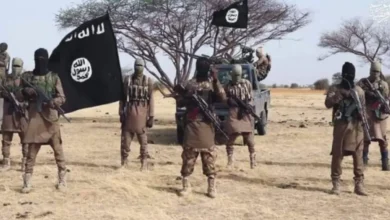ChristianityGeneral NewsIslamNational AssemblyNews
Religious Discrimination (Prohibition, Prevention Etc) Bill 2021 (1)

EXPLANATORY MEMORANDUM
This Bill seeks to provide a mechanism for enforcing certain provisions of the Constitution of the Federal Republic of Nigeria 1999 as altered, Universal Declaration of Human Rights, International Covenant on Civil and Political Rights, Convention on the Elimination of All Forms of Discrimination Against Women, African Charter on Human and Peoples’ Rights, the Protocol to the African Charter on Human and Peoples’ Rights on the Rights of Women in Africa.
Religious Discrimination (Prohibition, Prevention Etc.) Bill 2021
ARRANGEMENT OF SECTIONS
Section
1. Citation.
2. Objectives.
3. Interpretations.
4. Discriminatory conduct.
5. Conduct engaged on the basis of one or more reasons.
6. Burden of proof.
7. Discrimination in relation to hiring or recruitment.
8. Discrimination in relation to terms and conditions of employment.
9. Discrimination relating to qualifying/Professional Bodies.
10. Employment Agencies.
11. Discrimination in Educational Institutions.
12. Goods, services and facilities.
13. Discrimination in employment in security and other sectors.
14. Sports.
15. Exception on the ground of charity.
16. Order of court.
17. Administrative Redress Panel.
18. Jurisdiction.
19. Procedure.
20. Miscellaneous provisions.
Religious Discrimination (Prohibition, Prevention Etc.) Bill 2021
A Bill For an Act to provide a mechanism for enforcing certain provisions of the Constitution of the Federal Republic of Nigeria 1999 as altered, Universal Declaration of Human Rights, International Covenant on Civil and Political Rights, Convention on the Elimination of All Forms of Discrimination Against Women, African Charter on Human and Peoples’ Rights, the Protocol to the African Charter on Human and Peoples’ Rights on the Rights of Women in Africa, and other related matters.
Sponsor:
Commencement
Enacted by the National Assembly of the Federal Republic of Nigeria:
PART A – PRELIMINARY
1 This Bill may be cited as the Religious Discrimination (Prohibition, Prevention etc.) Bill, 2021.
Citation.
2 The objectives of this Bill includes the following;
(a) prevent, prohibit and eliminate, so far as practicable, all forms of discrimination, intimidation and harassment against persons on the ground of religious belief or activity or on the ground of manifestation of religion or religious belief in a wide range of areas of private and public life;
(b) ensure that everyone has equal rights to equality before the law and access to education, health care, employment, financial services, recreational activities and other services regardless of religious belief or activity and manifestation of religion or religious belief consistent with the obligations of Nigerian to respect, promote, fulfill and protect the right to freedom of thought, conscience and religion and the rights against all forms of discrimination enshrined in the United Nations’ Declaration of Human Rights, International Covenant on Civil and Political Rights, Convention on the Elimination of All Forms of Discrimination Against Women, African Charter on Human Peoples’ Rights, Protocol to the African and other similar Conventions, Charters, Treaties, Covenants or Protocols; and
(c) give effect to sections 39 and 42 of the Constitution of the Federal Republic of Nigeria and, subject to specified limits, prohibit all forms of discrimination against any person on the basis of his or her religious belief or activities or manifestation of religious belief in teaching, practice, worship and observance.
Objectives.
3 In this Bill
“Commission” means the National Human Rights Commission;
“Conditions of service” includes rules, procedures and stipulation that employees must abide by as part of their employment contract;
“Code of conduct” means a set of rules setting out or outlining the norms, rules, and responsibilities or proper practices of an individual party or an organization;
“Educational institution” means a school, college, university or other institution at which education or training is provided;
“Employer” includes a person acting or purporting to act on behalf of an employer;
“Employer conduct rule” means a condition, requirement or practice;
(a) that is imposed, or proposed to be imposed, by an employer on its employees or prospective employees; and
(b) that relates to standards of dress, appearance or behaviour of those employees;
“Employment” means:
(a) work under a contract of employment; or
(b) work that a person is otherwise appointed or engaged to perform; whether the work is on a full-time, part-time, temporary or casual basis, or whether it is paid or unpaid;
“Engage in conduct” means:
(a) to do an act; or
(b) to omit to perform an act;
“High Court” mean a High Court of a state, Federal High Court and of the High Court of the Federal Capital Territory;
“Person” has the same meaning as in the Interpretation Act Cap 123 LFN 2004;
“Registered charity organization” means a non-profit making entity that is registered with the Corporate Affairs Commission under Part C of the Companies and Allied Matters Act for the time being in force.
“Religious emblem” includes decent religious wear, dress, head cover, hijab, the tunic and veil otherwise called habit etc.
“Religious belief or activity” means:
(a) holding a religious belief; or
(b) engaging in lawful religious activity; or
(c) not holding a religious belief; or
(d) not engaging in, or refusing to engage in, lawful religious activity;
“Services” means services of any kind, including the following:
(a) services relating to banking, insurance, healthcare, superannuation and the provision of grants, loans, credit or finance;
(b) services relating to entertainment, recreation or refreshment;
(c) services relating to transport or travel;
(d) services relating to telecommunications;
(e) services of the kind provided by the members of any profession or trade;
(f) services of the kind provided by a government, or governmental authority or a local government body;
LFN means Law of the Federal of Nigeria.
Interpretation.
Part B—Discrimination On The Ground Of Religious Belief Or Activities Or Manifestation Of Religion Or Religious Belief
4(1) A person shall not, directly or indirectly or by any combination of the two, be intimidated, harassed, victimized or discriminated against, on the basis of religious belief or activity or on the ground of manifestation of religion or religious belief or any other ground of a characteristic that people who have or engage in the religious belief or activity generally have; and on the ground of a characteristic that people who have or engage in the religious belief or activity are generally presumed to have or manifest which may include wearing religious emblem, head cover, hijab, scarf, the tunic and veil otherwise called habit, decent and modest religious dress.
Discriminatory conduct.
(2)It shall constitute a direct discrimination on the ground of religious belief or activity or manifestation of religious belief where a person discriminates against another person on the ground of the other person’s religious belief or activity or on the ground of manifestation of the other person’s religious belief if
(a) the person treats, or proposes to treat, the other person less favourably than the person treats, or would treat, another person who does not have or engage in or manifest the religious belief or activity in circumstances that are not materially different; and
(b) the reason for the less favourable treatment is the other person’s religious belief or activity or manifestation of the other person’s religious belief in teaching, worship, practice or observance.
(c) A person discriminated against, under this section, shall be deemed to have been directly discriminated against.
(4) It shall constitute an act of indirect discrimination if a person discriminates against another person on the ground of the other person’s religious belief or activity or on the basis that the other person’s manifestation of religious belief where
(a) the person imposes, or proposes to impose, a condition, requirement, measure or practice;
(b) the condition, requirement, measure or practice has, or is likely to have, the effect of disadvantaging persons who have or engage in the same or different religion or activity or manifest religious belief as the other person; and
(c) the condition, requirement, measure or practice is unreasonable, unjustifiable or violates the provision(s) of the Constitution of the Federal Republic of Nigeria or any other existing Act of the National Assembly or the law of a state or human rights treaties, Charters, Covenants or Conventions which Nigeria has ratified;
(d) a person discriminated against, under this section, shall be deemed to have been indirectly discriminated against.
5(1) If a person engages in a conduct for any one or more reasons and one of the reasons is a person’s religious belief or activity or manifestation of religious belief (whether or not it is the dominant or a substantial reason for the conduct) then, for the purposes of this Bill, the conduct is deemed to be engaged in for that reason.
Conduct engaged on the basis of one or more reasons.
(2) Subject to section 4 subsection (4) paragraph (b) of this Bill whether a condition, requirement, measure or practice is unreasonable or unjustifiable depends on all the relevant circumstances of the case, including the following
(a) the nature and extent of the disadvantage resulting from the imposition, or proposed imposition of the condition, requirement, measure or practice;
(b) the nature of the roles, functions, or activities the person discriminated against is engaged in and whether the religious belief or activity or the manifestation of the person’s religious belief will affect, limit or jeopardize the person’s ability or capability in the performance of such roles, functions or activities;
(c) the likely harm or injury to be suffered by the person who imposes or proposes the imposition of the condition, requirement, measure or practice from the religious belief or activity or the manifestation of the religious belief of the person being discriminated against;
(d) the feasibility of overcoming or mitigating any harm or injury which may result from the manifestation of the person’s religious belief or activities warranting the imposition or proposed imposition of such condition, requirement, measure or practice;
(e) whether the harm or disadvantage is proportionate to the result sought by the person who imposes, or proposes to impose the condition, requirement, measure or practice;
(f) if the condition, requirement, measure or practice is an employer conduct rule, condition of service, code of conduct of an institution, the extent to which the rule would limit the right of the person to freedom of thought, conscience and religion and the right to manifestation of such religious belief; and
(g) possible inconsistency of the condition, requirement, measure or practice with the Constitution of the Federal Republic of Nigeria or the Nigerian’s obligations imposed by any of the United Nations’ or African Unions’ Human Rights Conventions, Charters, Treaties, Covenants or Protocols Nigeria has ratified with regard to respect, promotion and protection of human rights.
6(1) For the purposes of section 5 of this Bill the person who imposes, or proposes to impose the condition, requirement, measure or practice shall bear the burden of proving that such condition, requirement, measure or practice so imposed or proposed to be imposed is reasonable or justifiable or does not violate the provisions of the Constitution or any other existing Act of the National Assembly or the law of a state or human rights treaties, Charters, Covenants or Conventions which Nigeria has ratified.
Burden of proof.
(2) A person who imposes, or proposes to impose the condition, requirement, measure or practice shall not be said to have discharged the burden of proof unless he shows that compliance with such condition, requirement, measure or practice is necessary and in good faith.
(3) For the purposes of sections 7, 8, 9, 10 and 11 of this Bill a reference to an employee includes a reference to a prospective employee and reference to an employer includes a reference to a prospective employer.
PART C — CATEGORIES OF UNLAWFUL DISCRIMINATION
7 It shall be unlawful for an employer to discriminate against a person on the ground of the person’s religious belief or activity or on the ground of the other person’s manifestation of religious belief such as using or wearing religious emblem, religious head cover such as hijab, decent and modest religious wear etc.─
(a) in relation to the arrangements made with respect to the offer of employment;
(b) in the determination of who should be offered such employment; or
(c) in the terms or conditions on which employment is offered or accepted.
Discrimination in relation to hiring or recruitment.
8 It shall be unlawful for an employer to discriminate against an employee on the ground of the employee’s religious belief or activity or on the ground of the employee’s decision to manifest religious belief such as using or wearing religious emblem, religious head cover such as hijab, decent and modesty religious wear etc.─
(a) in relation to the terms or conditions of employment that the employer affords the employee;
(b) by denying the employee access, or by limiting the employee’s access, to opportunities for promotion, transfer or training, or to any other benefits associated with employment;
(c) by dismissing the employee; or
(d) by subjecting the employee to any other detriment such as intimidation, harassment, victimization or unfavouable working conditionss etc.
Discrimination in relation to terms and conditions of employment.
9(1)
9(2) It shall be unlawful for any qualifying or professional body or authority to discriminate a person on the ground of the person’s religious belief or activity or manifestation of the person’s religious belief─
(a) by refusing or delaying or failing to confer, renew, extend or vary the authorization or qualification or licence;
(b) in the terms or conditions on which the authority or body is prepared to confer, renew, extend or vary the authorization or qualification or licence;
(c) by revoking, varying or withholding or withdrawing the authorization or qualification or licence.
The qualifying or professional bodies or authority to which section 9 of this Bill apply include any qualifying or professional body or authority that is empowered to confer, renew, extend, revoke, vary or withdraw an authorization or qualification or licence that is needed for, or facilitates, the practice of a profession, the carrying on of a trade or the engaging in of an occupation.
Discrimination relating to qualifying/Professional Bodies.
10 It shall be unlawful for an employment agency to discriminate against a person on the ground of the person’s religious belief or activity or manifestation of religious belief─
(a) by refusing to provide the person with any of its services;
(b) in the terms or conditions on which it offers to provide the person with any of its services; or
(c) in the manner in which it provides the person with any of its services.
Employment Agencies
11(1) It shall be unlawful for an educational institution to discriminate against a person on the ground of the person’s religious belief or activity or manifestation of the person’s religious belief such as using or wearing religious emblem, decent and modest religious wear etc.─
(a) by refusing or failing to accept the person’s application for admission as a student; or
(b) in the terms or conditions on which it is prepared to admit the person as a student.
Discrimination in Educational Institutions.
(2) It is unlawful for an educational institution to discriminate against a student on the ground of the student’s religious belief or activity or manifestation of the student’s religion or religious belief by
(a) denying the student access, or limiting the student’s access, to any benefit provided by the educational institution;
(b) expelling the student; or
(c)subjecting the student to any other detriment.
Provided that if an educational institution shall adopt any uniform dress code or code of conduct prescribing decent dressing as well as manner of dressing, a student may take into consideration such dress code or code of conduct as to decency and manner of dressing in the manifestation of his religious belief in relation to the choice of colour, type, or design of such religious emblem, religious head cover such as hijab, decent and modest religious wear etc.
(3) Nothing in sub-section (2) of this Section shall be construed to empower any educational institution to impose or propose to impose any condition, requirement, measure or practice in its dress code or code of conduct limiting the right of the students to manifest their religious belief in worship, teaching, practice and observance.
12(1) It shall be unlawful for a person who, whether for payment or not, provides goods or services, or makes facilities available, to discriminate against another person on the ground of the other person’s religious belief or activity or manifestation of the other person’s religious belief─
(a) by refusing to provide the other person with those goods or services or to make those facilities available to the other person;
(b) in the terms or conditions on which the person provides the other person with those goods or services or makes those facilities available to the other person; or
(c) in the manner in which the person provides the other person with those goods or services or makes those facilities available to the other person.
Goods, services and facilities.
(2) It shall be unlawful for a person to deny or propose to deny or limit another person’s access to public good, services or facilities such as health care, finance, education or recreational activities, registration in any private or public office, or services such as registration for passport or any other means of identification, SIM card registration, or any other enrollment exercise of a public nature, on the basis of the person’s religious belief or activities or on the ground of manifestation of the person’s religious belief in practice, teaching, worship or observance.
(3)
A person shall not be subject to any condition, requirement, measure or practice that limits or proposes to limit the person’s right to manifest his religious belief such as using or wearing religious emblem, religious head cover such as hijab, tunic and veil, decent and modest religious wear etc., as a condition to access public good, services or facilities such as access to finance, health, education, recreational activities or registration with any private or public office, or services such as registration for passport or any other means of identification, SIM card registration, or any other enrollment exercise of a public nature.
13(1) It shall be unlawful to discriminate against a person employed in the security sector, military, paramilitary or otherwise on the basis of the person’s religious belief or activities or manifestation of religion or religious belief─
(a) in relation to the terms or conditions of employment that the employer affords the person so employed;
(b) by denying the employee access, or by limiting the employee’s access, to opportunities for promotion, transfer or training, or to any other benefits associated with employment; or
(c) by dismissing the employee; or
(d) by subjecting the employee to any other detriment such as intimidation, punishment, harassment, victimization or unfavorable working condition etc.
Discrimination in employment in security and other sectors.
(2) Any person employed in the security sector, whether within the military or paramilitary or otherwise, shall not be discriminated against on the ground of the exercise of his right to manifestation of his religion in worship, teaching, practice and observance such as wearing religious emblem, head cover, or hijab in concomitant with the common uniform code or code of conduct in relation to the choice of colour, type, or design of such religious emblem, religious head cover or hijab.
(3) It shall be unlawful for any person charged with the performance of any function or who exercises any power─
(a) under an Act of the National Assembly or the Law of as State;
(b) under any international treaties, charters, covenants or conventions whether of the United Nations, African Union, Commonwealth or ECOWAS etc. which Nigeria has ratified; or
(c) for the purposes of a program conducted by or on behalf of the government of the Federal Republic of Nigeria or of a state or the United Nations, African Union, Commonwealth, or ECOWAS etc –
to discriminate against another person on the ground of the other person’s religious belief or activity or on the ground of the manifestation of the person’s religious belief, in performing that function, exercising that power or fulfilling that responsibility.
14 It shall be unlawful for a person to discriminate against another person on the ground of the other person’s religious belief or activity or on the ground of manifestation of religious belief excluding that other person from participation in a sporting activity.
Sports
PART D – EXCEPTIONS AND EXEMPTIONS
15 Nothing in this Part shall─
(a) affect a provision of the governing rules or constitution (within the meaning of the extant Company and Allied Matters Act of a registered charity organization, if the provision─
(i) confers benefits for charitable purposes, or
(ii) enables charitable benefits to be conferred
wholly or in part on persons who have or engage in a particular religious belief or activity; or
(b) makes unlawful any conduct engaged in to give effect to such a provision.
Exception on the ground of charity.
PART E- IMPLEMENTATION AND ENFORCEMENT MECHANISM
17(1) Without prejudice to the right of any person to seek redress in a court of competent jurisdiction, the National Human Rights Commission shall have the power either on its own motion or upon a petition presented by an aggrieved person to─
(a) investigate allegations of any violation of the provisions of this Bill within a reasonable time or not more than 30 days;
(b) invite any person/party to respond to allegations made against him within seven days;
(c) issue administrative orders to protect the subject matter or for parties to maintain status quo in relation to an allegation pending the outcome of investigation;
(d) upon conclusion of the investigation determine the appropriate redress within 14 working days, and
(e) require any person to comply with such order or terms of redress within a specified period of time not extending 14 days.
Administrative Redress Panel.
(2) Where the Commission upon receipt of a complaint and after due investigation gives a direction under this Bill and a person to which such complaint relates fails to take any step to reverse any act of discrimination the Commission may proceed to initiate proceedings against such person, organ, body, institution, public or private enterprise in the appropriate court.
(3) Nothing in this Bill shall be construed to limit or foreclose the right of an aggrieved person to approach the court, at the first instance, to seek redress upon a seven (7) days’ pre-action notice served on the person against whom the allegation is made.
18 A High Court shall have original jurisdiction to look into applications arising from any breach or violation of the provisions of this Bill.
Jurisdiction.
19 Procedure for enforcing this Bill in court shall be in accordance with the extant procedure for the enforcement of Fundamental Rights in a High Court.
Procedure.
20 If a breach or violation of this Bill is proved to have been committed with the consent, acquiescence or connivance or is attributed to any neglect on the part of any director, manager, secretary or other similar officer of a body corporate, or any person who was purporting to act in any such capacity, such officer as well as the body corporate shall be deemed to have commited an offence and are liable to be proceeded against and punished accordingly. Miscellaneous provisions.
Source: Leadership









